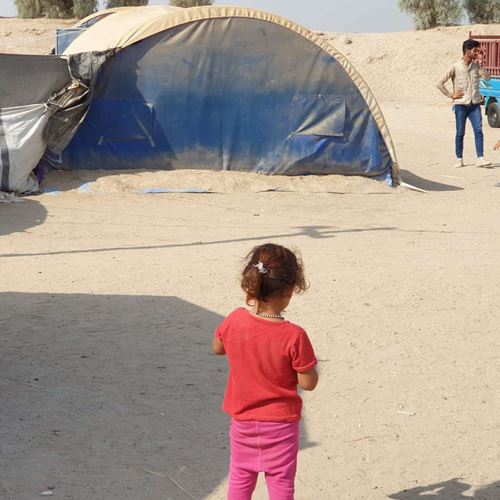
Early marriage persists across much of Iraq, yet it acutely impacts displaced populations in informal settlements.
Nearly 1.1 million people remain internally displaced in Iraq, including nearly 100,000 Internally Displaced People (IDPs) living in informal sites. People within these sites live in makeshift shelters, tents or abandoned buildings and have been both physically and socially marganisalised from national mechanisms, government services and society.
Displacement robs people of their safety, security and stability as people are uprooted from their homes, communities and social structures. Too often, people are forced to live in poverty due to a lack of livelihood opportunities and isolation from national safety nets.
IDPs in these sites also have extremely limited access to national security actors such as police and struggle to access judicial procedures.
Communities DRC works with report that early marriage is often perceived as a way to protect girls from sexual exploitation and harassment. It can also be a negative coping mechanism in response to economic hardship as a girl’s family sometimes simply cannot afford another mouth to feed and needs the cash influx that the kahr – dowry – brings.
Due to restricted access to legal systems and national security mechanisms like the police, IDPs resort to community-driven solutions. In regions with inadequate judicial capabilities, tribal customary law, or urf, can serve as a crucial interim measure. Nevertheless, certain practices are detrimental and do not align with Iraq’s judicial system.
Commonly, grievances would be resolved through payment of money. Yet, conflicts can also be addressed through the arrangement of marriages, wherein the offending family or tribe supplies the bride, and the aggrieved family or tribe provides the groom. This is particularly common amongst IDPs due to their lack of finances.
In Ninewa, northern Iraq, a recent dispute was settled using this approach, involving the marriage of a 12-year-old girl as reparation for a prior offense. The offended family had proposed that their son marry the elder daughter, but the girl's family declined, and she married a different man. Tribal customary law frequently revolves around preserving the reputation and honour of community members.


